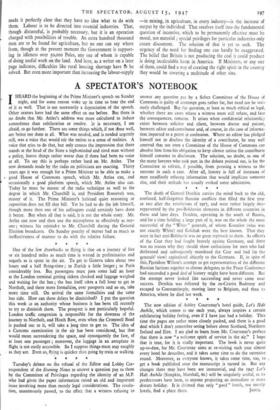A SPECTATOR'S NOTEBOOK I HEARD the beginning of the Prime Minister's
speech on Sunday night, and for some reason woke up in time to hear the end of it as well. That is not necessarily a depreciation of the speech. Other orators have had the same effect on me before. But there is no doubt that Mr. Attlee's address was more calculated to induce somnolence than exhilaration or resolve. It is necessary, I am afraid, to go further. There are some things which, if not done well, are better not done at all. What was needed, and is needed urgently still, was a voice that would stir the nation to a sense of realities. A voice that tries to do that, but only creates the impression that there stands at the head of the State a high-minded and tired man without a policy, leaves things rather worse than if there had been no voice at all. To say this is perhaps rather hard on Mr. Attlee. The new demands made by the radio on politicians are exacting. Thirty years ago it was enough for a Prime Minister to be able to make a
. good House of Commons speech, which Mr. Attlee can, and occasionally a good platform speech, which Mr. Attlee also can. Today he must be master of the radio technique as well to the degree in which Mr. Churchill is, and President Roosevelt was, master of it. The Prime Minister's habitual quiet reasoning or exposition does not fill that bill. Yet he had to do the job himself, though more than one of his colleagues could certainly have done it better. But when all that is said, it is not the whole story. Mr. Attlee can now and then use the microphone as effectively as any- one ; witness his rejoinder to Mr. Churchill during the General Election broadcasts. On Sunday paucity of matter had as much as ineffectiveness of manner to do with the relative failure.


































 Previous page
Previous page